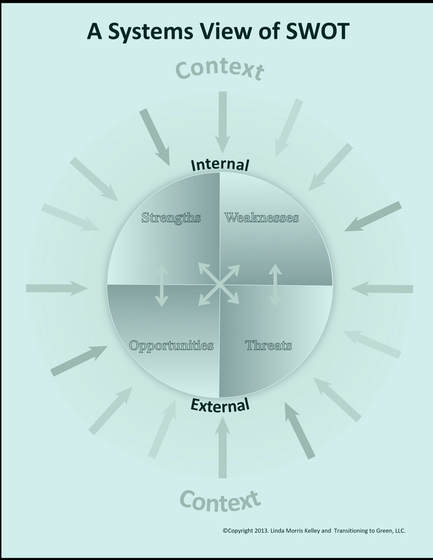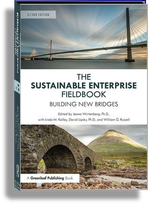CHAPTER 4: MANAGING CHANGE TO A SUSTAINABLE ENTERPRISE
|
ACTIVITIES
|
|
TOOLS
|
Supplemental Resources

Recommended Articles
- Redefining Business Success, Management For A Rapidly Changing World, BSR, Jan 2018: Drawing on BSR’s 25 years of experience working with companies and their stakeholders from corporate headquarters to remote operations and sourcing locations, this report presents our view of how companies can transform their strategies, governance, and management so that they are fit for a disruptive world.
- Summary of Redefining Business Success, Management For A Rapidly Changing World, BSR, Jan 2018: The future of sustainable business lies in the creation of resilient business strategies that respond to this rapidly shifting external context as interconnected business matters, rather than as a collection of isolated sustainability issues, which will require cohesive and holistic business leadership. Resilient business strategies will be most effective if they are based upon an “act, enable, influence” approach to company strategy, governance, and management. This “act, enable, influence” framework is our blueprint for the future of sustainable business.
- CEO Decision Making For Sustainability NBS-SA_Main-Report 2016: CEOs play a crucial role in fostering an environment that supports embedding sustainability into the strategies and day-to-day decisions of their organizations. This report asks:Why do some CEOs make the shift to incorporate sustainability into their decision-making (and what holds others back)?
- The Future of Management Is Teal, July 2015: The premise of this article is that humanity is at a threshold; a new form of organization is emerging into public view. Anthropological research suggests that this is a natural next step in a process that began more than 100,000 years ago. There have been, according to this view, at least five distinct organizational paradigms in human history. Could the current organizational disillusionment be a sign that civilization is outgrowing the current model and getting ready for the next?
- Dialogic OD A Theory of Practice, 2013: ......."In this paper, I describe my generic Dialogic OD change process. I invite you to look under the hood at practices as disparate as Open Space, Visual Explorer, and World Café with me, and I will describe the engine I see behind transformational change...."
- Embracing and Managing Change Sustainably: Provides an insight into managing change within a sustainable enterprise with a window to the key concepts, transformational challenge, transformational elements and example of a Petrochemical refinery that implemented this.
- Teaching Organisational Change Management for Sustainability: designing and delivering a course at the University of Leeds to better prepare future sustainability change agents: A number of universities worldwide have created new courses and degrees or modified existing ones, as a response to the increasing interest by companies to hire sustainability literate graduates.......This paper presents the process of designing and delivering a new course on organizational change management for sustainability for the BA Environment and Business degree at the University of Leeds. The course was developed based on holism and a constructivist position to help deal with the complexities of sustainability and organizational change management.

- Top 30+ Must Reads on Change Management: Change has become an everyday part of organizational dynamics. Any organization that will not make changes risks being left behind, forgotten, risks competitors driving them out of business or faces possible closure. The blog provides 30 top links to read on change management.
- Best practices in sustainability: Ford, Starbucks and more: While the vast majority of US companies are asleep at the wheel when it comes to facing up to multiple sustainability challenges, a select group is waking up to the need for urgent action. In a new report, Ceres, a non-profit focused on sustainable business, lambasted the lack of progress across American corporations in general – but also highlighted some companies that deserve praise.
- Top 40 Most Popular Case Studies of 2017: Yale School of Management has generated a list of the 40 most popular Yale School of Management case studies in 2017 by combining data from our publishers, Google analytics, and other measures of interest and adoption. Case topics represented on the list vary widely, but a number are drawn from the case team’s focus on healthcare, asset management, and sustainability. The cases also draw on Yale’s continued emphasis on corporate governance, ethics, and the role of business in state and society.......Read on to learn more about the top 10 most popular cases followed by a complete list of the top 40 cases of 2017.
- Beyond the roots of human inaction: Fostering collective effort toward ecosystem conservation: The term “environmental problem” exposes a fundamental misconception: Disruptions of Earth’s ecosystems are at their root a human behavior problem. Psychology is a potent tool for understanding the external and internal drivers of human behavior that lead to unsustainable living. Psychologists already contribute to individual-level behavior-change campaigns in the service of sustainability, but attention is turning toward understanding and facilitating the role of individuals in collective and collaborative actions that will modify the environmentally damaging systems in which humans are embedded. Especially crucial in moving toward long-term human and environmental well-being are transformational individuals who step outside of the norm, embrace ecological principles, and inspire collective action. Particularly in developed countries, fostering legions of sustainability leaders rests upon a fundamental renewal of humans’ connection to the natural world.
